GKS (2024) Global Korea Scholarships Undergraduate
Estimated reading time: 28 minutes
The Global Korea Scholarships (GKS) for the intake of 2024–2025 were formally announced. Undergraduate and Associate degree programs under the Korean Government Scholarship in Korea are now accepting online applications from international students for admission in 2024. Global Korean Scholarship (GKS) 2024-2025 is the rebranded name for the Korean Government Scholarship. The GKS scholarship will enable all candidates selected for this opportunity to earn both an associate’s and an undergraduate degree. The Global Korea Scholarship program is offered at almost every university in South Korea. The Global Korea Scholarship program provides 200 GKS scholarships for students from other countries.
What is the purpose of the Global Korea Scholarships (GKS 2024)?
The purpose of the Global Korea Scholarship (GKS) is to promote international cooperation in education and to support talented students who will contribute to the development of Korea and their home countries. Specifically, the GKS aims to achieve the following goals:
- Attract talented international students to Korean universities: The scholarship program aims to attract and support talented students worldwide to pursue their undergraduate or graduate studies in Korea. This will help diversify Korean universities’ student body and enhance Korean higher education’s global competitiveness.
- Foster a global network of future leaders: By providing scholarship recipients with various opportunities for cultural experiences, field trips, internships, and networking, the GKS aims to foster a global network of future leaders who will contribute to developing their home countries and Korea’s global partnerships.
- Promote Korean language and culture: The scholarship program provides Korean language training as part of its benefits, which will help scholarship recipients to better integrate into Korean society and to deepen their understanding of Korean culture. This will also help to promote Korean language and culture worldwide.
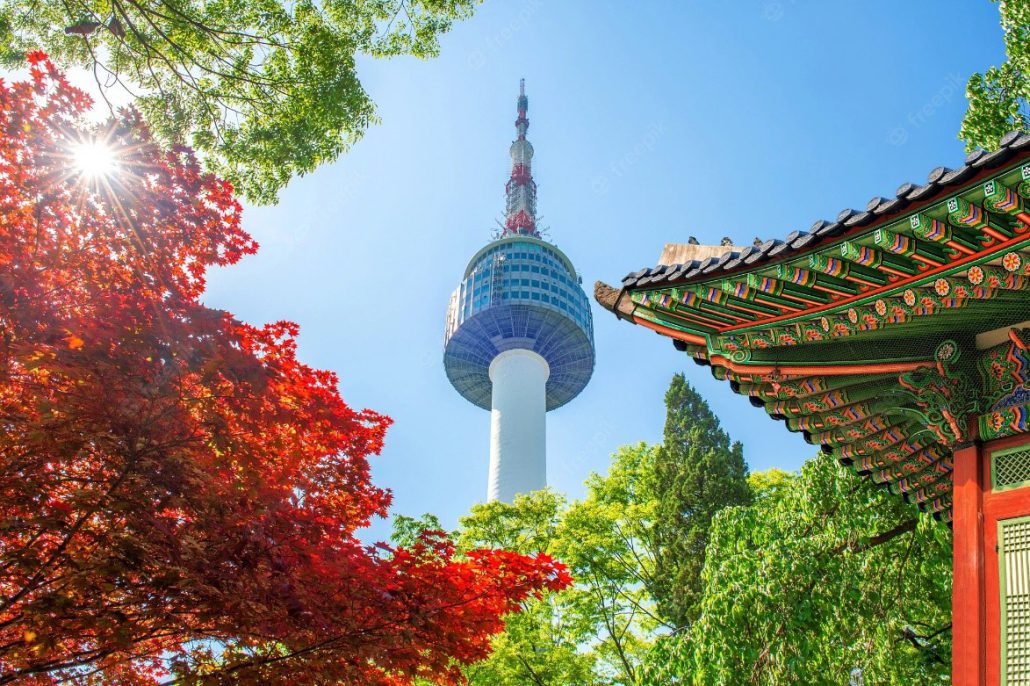
Benefits of the Global Korea Scholarships (GKS 2024): Undergraduate Degrees
The following support is available to recipients of The Global Korea Scholarships:
1-The grantees’ air travel expenses will be covered by Global Korea Scholarship.
2-It will give the grantees a KRW 200,000 relocation or resettlement allowance.
3-The allowance will be KRW 20,000 per month to cover living costs.
4-Health insurance will cost KRW 20,000 per month.
5- Every recipient will receive KRW 800,000 every three months to cover the cost of the required language course.
6-Coverage of tuition fees (of maximum KRW 5,000,000 per semester)
7- A reward for proving Korean language proficiency.
8-A grant for research expenses of up to KRW 240,000 (per semester)
9-A grant for the cost of printing the dissertation or thesis in the range of 500,000 and 800,000 KRW
10-KRW 100,000 will be awarded upon successful completion of the degree program.
Note that only those students enrolled in a research-based program will be awarded the grant for research and publishing the papers and thesis.
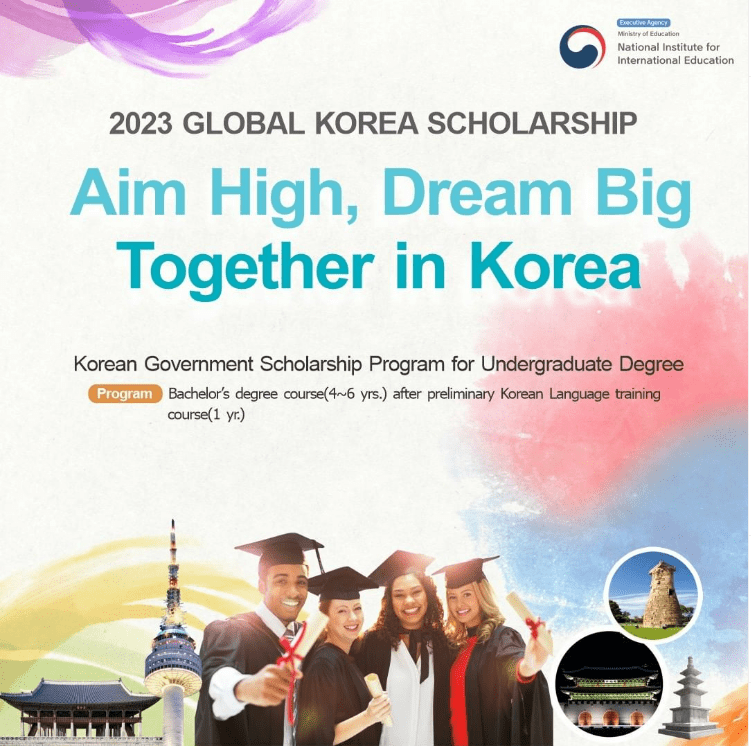
Undergraduate Degree Programs
| Category | Associate Degree | Bachelor’s Degree |
| Period | 1 year of Korean language program + 2~3 years of the degree program | 1 year of the Korean language program + 4~6 years of degree program |
Application Tracks: Undergraduate Degrees
| Embassy Track | General | 74 |
| Embassy Track | Overseas Koreans | 7 |
| Embassy Track | Subtotal | 81 |
| University Track | UIC* | 55 |
| University Track | Regional University | 49 |
| University Track | Associate Degree | 15 |
| University Track | Subtotal | 119 |
* UIC Program under University Track provides customized curriculum and field experience through industry-university cooperation focused on the fields of natural science and engineering
Available Universities and Fields of Study: Undergraduate Degrees
Available Fields of Study
- All fields of study offered by KGSP participating universities
- Academic programs offered during evenings (night school), short-term programs, and online and distant-learning programs are not applicable in this scholarship program
- Applicants can only apply to the universities and departments that are listed in the “University Information” file attached under the GKS Notice post on Study in Korea website (www.studyinkorea.go.kr > Scholarships > GKS Notice)
Available Universities and Fields of Study (Divisions): Undergraduate Degrees
Available Field of Study
1-Embassy Track
| Program | Classification | Available Universities | Quota |
| General & Overseas Koreans | Type A (24 institutions) | Ajou UniversityChung-Ang University, Dongguk University (Seoul), Duksung Women’s University, Ewha Woman’s University, Hankuk University of Foreign Studies, Hanyang University (Seoul), Inha University, Konkuk University, Kookmin University, Korea University, Kyung Hee University, Seokyeong University, Seoul National University, SeoulTech (Seoul National University of Science and Technology), Shinhan University, Sogang University, Sookmyung Women’s University, Sungkyunkwan University, Sungshin Women’s University, Tech University of Korea, UNIST (Ulsan National Institute of Science and Technology), University of Seoul, Yonsei University | 81 Scholars (Bachelor’s Degree) |
| General & Overseas Koreans | Type B (30 institutions) | Busan University of Foreign Studies, Chonnam National University, Chungbuk National University, Chungnam National University, Daegu University, Daejeon University, Dong-A University, Dongseo University, Gyeongsang National University, Hannam University, Hoseo University, Inje University, Jeju National University, Jeonbuk National University, Kangwon National University, Keimyung University, Kongju National University, Konyang University, KOREATECH (Korea University of Technology and Education), Kyungpook National University, National Korea Maritime & Ocean University, Pai Chai University, Pukyong National University, Pusan National University, Semyung University, Silla University, Soonchunhyang University, Sun Moon University, Sunchon National University, Yeungnam University | 81 Scholars (Bachelor’s Degree) |
*Note: Embassy Track applicant may choose up to THREE different universities from Type A and B and MUST apply to at least one of the universities listed under Type B
2-University Track
| Program | Available Universities | Quota |
| UIC (10 institutions) | [Bachelor’s Degree Program] Ajou University, Konyang University, Kookmin University, KOREATECH (Korea University of Technology and Education), Pusan National University, Sogang University, Soonchunhyang University, Tech University of Korea [Associate Degree Program] Kyungbok University, Yeungjin University | 47 scholars (Bachelor’s) & 8 scholars (Associate) |
| Regional (30 institutions) | Busan University of Foreign Studies, Chonnam National University, Chungbuk National University, Chungnam National University, Daegu University, Daejeon University, Dong-A University, Dongseo University, Gyeongsang National University, Hannam University, Hoseo University, Inje University, Jeju National University, Jeonbuk National University, Kangwon National University, Keimyung University, Kongju National University, Konyang University, KOREATECH (Korea University of Technology and Education), Kyungpook National University, National Korea Maritime & Ocean University, Pai Chai University, Pukyong National University, Pusan National University, Semyung University, Silla University, Soonchunhyang University, Sun Moon University, Sunchon National University, Yeungnam University | 49 scholars (Bachelor’s) |
| Associate (3 institutions) | Kyungbok University, Osan University, Yeungjin University | 15 scholars (Associate) |
Embassy Track- The Global Korea Scholarships 2024
General: 74 scholars from 67 countries
Overseas Koreans: 7 scholars from 7 countries
| No. | Country | General | Overseas Korean | Total | No. | Country & Region | General | Overseas Korean | Total |
| 1 | Afghanistan | 1 | 0 | 1 | 35 | Mexico | 1 | 1 | 2 |
| 2 | Angola | 1 | 0 | 1 | 36 | Mongolia | 2 | 0 | 2 |
| 3 | Azerbaijan | 1 | 0 | 1 | 37 | Morocco | 1 | 0 | 1 |
| 4 | Bangladesh | 1 | 0 | 1 | 38 | Mozambique | 1 | 0 | 1 |
| 5 | Bhutan | 1 | 0 | 1 | 39 | Myanmar | 1 | 0 | 1 |
| 6 | Bolivia | 1 | 0 | 1 | 40 | Nepal | 1 | 0 | 1 |
| 7 | Brazil | 1 | 0 | 1 | 41 | Nigeria | 1 | 0 | 1 |
| 8 | Brunei | 1 | 0 | 1 | 42 | Pakistan | 1 | 0 | 1 |
| 9 | Bulgaria | 1 | 0 | 1 | 43 | Panama | 1 | 0 | 1 |
| 10 | Cambodia | 1 | 0 | 1 | 44 | Paraguay | 1 | 0 | 1 |
| 11 | Canada | 1 | 0 | 1 | 45 | Peru | 1 | 0 | 1 |
| 12 | Chile | 1 | 0 | 1 | 46 | Philippines | 1 | 0 | 1 |
| 13 | Colombia | 2 | 0 | 2 | 47 | Poland | 1 | 0 | 1 |
| 14 | Dominican Republic | 1 | 0 | 1 | 48 | Russia | 1 | 1 | 2 |
| 15 | DR Congo | 1 | 0 | 1 | 49 | Rwanda | 1 | 0 | 1 |
| 16 | Ecuador | 1 | 0 | 1 | 50 | Singapore | 1 | 0 | 1 |
| 17 | Egypt | 1 | 0 | 1 | 51 | Sri Lanka | 1 | 0 | 1 |
| 18 | El Salvador | 1 | 0 | 1 | 52 | Sudan | 1 | 0 | 1 |
| 19 | Equatorial Guinea | 1 | 0 | 1 | 53 | Sweden | 1 | 0 | 1 |
| 20 | Ethiopia | 1 | 0 | 1 | 54 | Tajikistan | 1 | 0 | 1 |
| 21 | Fiji | 1 | 0 | 1 | 55 | Tanzania | 1 | 0 | 1 |
| 22 | Gabon | 1 | 0 | 1 | 56 | Thailand | 1 | 0 | 1 |
| 23 | Ghana | 1 | 0 | 1 | 57 | Timor-Leste | 1 | 0 | 1 |
| 24 | Guatemala | 1 | 0 | 1 | 58 | Trinidad and Tobago | 1 | 0 | 1 |
| 25 | India | 2 | 0 | 2 | 59 | Turkey | 1 | 0 | 1 |
| 26 | Indonesia | 2 | 0 | 2 | 60 | Turkmenistan | 1 | 1 | 2 |
| 27 | Iran | 1 | 0 | 1 | 61 | Uganda | 1 | 0 | 1 |
| 28 | Japan | 1 | 0 | 1 | 62 | Ukraine | 1 | 1 | 2 |
| 29 | Jordan | 1 | 0 | 1 | 63 | Uruguay | 1 | 0 | 1 |
| 30 | Kazakhstan | 1 | 1 | 2 | 64 | Uzbekistan | 1 | 1 | 2 |
| 31 | Kenya | 1 | 0 | 1 | 65 | Venezuela* | 1 | 0 | 1 |
| 32 | Kyrgyzstan | 1 | 1 | 2 | 66 | Vietnam | 4 | 0 | 4 |
| 33 | Laos | 1 | 0 | 1 | 67 | Yemen | 1 | 0 | 1 |
| 34 | Malaysia | 1 | 0 | 1 | 68 | Total | 74 | 7 | 81 |
* Korean Embassy in Venezuela may select an applicant from Guyana or Suriname based on local circumstances.
※ Overseas Koreans refer to ethnic Korean without Korean citizenship. Overseas Koreans include offspring of Korean diaspora or Korean immigrants who live in countries out of the Korean peninsula
University Track: The Global Korea Scholarships (GKS 2024)
University Industry Cooperation (UIC) Program: 55 scholars
※ UIC Program is open to all countries around the world
| Category | University | Department | 9 |
| Bachelor’s Degree | Ajou University | Software Engineering | 5 |
| Bachelor’s Degree | Konyang University | Department of Cyber Security | 6 |
| Bachelor’s Degree | Konyang University | Department of Medical Artificial Intelligent | 6 |
| Bachelor’s Degree | Kookmin University | School of Software | 6 |
| Bachelor’s Degree | Kookmin University | School of Artificial Intelligence | 6 |
| Bachelor’s Degree | Tech University of Korea | Department of Mechatronics Engineering | 6 |
| Bachelor’s Degree | Korea University of Technology and Education (KOREATECH) | School of Mechanical Engineering | 6 |
| Bachelor’s Degree | Korea University of Technology and Education (KOREATECH) | School of Computer Science and Engineering | 6 |
| Bachelor’s Degree | Pusan National University | Mechanical Engineering | 6 |
| Bachelor’s Degree | Pusan National University | Industrial Engineering | 6 |
| Bachelor’s Degree | Pusan National University | Computer Science and Engineering | 6 |
| Bachelor’s Degree | Pusan National University | Nano Energy Engineering | 6 |
| Bachelor’s Degree | Pusan National University | Nanomechatronics Engineering | 6 |
| Bachelor’s Degree | Pusan National University | Optics and Mechatronics Engineering | 4 |
| Bachelor’s Degree | Pusan National University | Biological Sciences | 4 |
| Bachelor’s Degree | Sogang University | Electronic Engineering | 5 |
| Bachelor’s Degree | Sogang University | Chemical & Biomolecular Engineering | 5 |
| Bachelor’s Degree | Soonchunhyang University | Internet of Things | 5 |
| Bachelor’s Degree | Soonchunhyang University | Medical IT Engineering | 5 |
| Bachelor’s Degree | Soonchunhyang University | Information Security Engineering | 5 |
| Bachelor’s Degree | Soonchunhyang University | Computer Software Engineering | 5 |
| Bachelor’s Degree | Soonchunhyang University | AI and Big Data | 5 |
| Associate Degree | Kyungbok University | Big Data | 4 |
| Associate Degree | Yeungjin University | Computer Information | 4 |
| Associate Degree | Yeungjin University | AI Convergence Mechanical Engineering | 4 |
Regional Universities and Associate Degree Program: 64 scholars from 6 regions
| Region | Country | Regional | Associate |
| Southeast Asia (11) | Brunei, Cambodia, Indonesia, Laos, Malaysia, Myanmar, Philippines, Singapore, Thailand, Timor-Leste, Vietnam | 23 | 7 |
| Northeast Asia (2) | Japan, Mongolia | 3 | 1 |
| Southwest Asia (7) | Afghanistan, Bangladesh, Bhutan, India, Nepal, Pakistan, Sri Lanka | 9 | 3 |
| Central Asia (5) | Kazakhstan, Kyrgyzstan, Tajikistan, Turkmenistan, Uzbekistan | 6 | 2 |
| the Americas, Europe, the Pacific (28) | Armenia, Azerbaijan, Belarus, Bolivia, Brazil, Bulgaria, Canada, Chile, Colombia, Dominican Republic, Ecuador, El Salvador, Fiji, Georgia, Guatemala, Mexico, Moldova, Panama, Paraguay, Peru, Poland, Russia, Sweden, Trinidad and Tobago, Turkey, Ukraine, Uruguay, Venezuela | 3 | 1 |
| the Middle East, Africa (19) | Angola, DR Congo, Egypt, Equatorial Guinea, Ethiopia, Gabon, Ghana, Iran, Jordan, Kenya, Morocco, Mozambique, Nigeria, Rwanda, Senegal, Sudan, Tanzania, Uganda, Yemen | 5 | 1 |
Eligibility criteria: Undergraduate Degrees GKS 2024
1- Nationality
All applicants must hold citizenship of NIIED-designated countries that are invited to take part in the GKS program
-Applicants’ parents (or legal guardians) must hold citizenship from another country other than Korea. If applicants or their parents hold dual citizenship (one who has both Korean citizenship and citizenship of another country), such applicant is NOT eligible to apply
-Applicants and their parents who had previously held Korean citizenship must submit documentation issued by the Korean government that proves their renunciation of Korean citizenship
-If an applicant’s citizenship is changed during the selection process, he or she will be excluded from the evaluation. (Not applicable to UIC applicants)
2- Level of Education
Bachelor “s degree program is for applicants who graduated (or are expected to graduate) from a high school or from an associate degree program.
The associate degree program is for applicants who graduated (or are expected to graduate) from a high school
-Applicants who have a bachelor’s degree cannot apply. Applicants who have an associate degree can only apply to a bachelor’s program
-Applicants who are expected to graduate must first submit a certificate of expected graduation at the time of application. If such applicants pass the final round of selection, they must submit a graduation certificate (or a degree certificate) by February 28, 2024
– Applicants who submit their provisional graduation certificate will be considered as applicants who are expected to graduate
3-Grades
The cumulative Grade Point Average (CGPA) of the entire curriculum from the previous (degree) program must meet one of the two conditions below;
-Score percentile should be 80% or above on a 100-point scale or be ranked within the top 20% of one’s class
-CGPA must be equal to or above 2.64/4.0, 2.80/4.3, 2.91/4.5, or 3.23/5.0
※ Previous degree program for Associate degree program applicants: high school program
※ Previous degree program for Bachelor “s applicants: high school or associate degree program.
4-Age
-Must be under 25 years of age (born after March 1, 1998)
All applicants must have no grounds for disqualification (e.g., criminal history) for overseas travel
5-Health
All applicants must be in good health, both mentally and physically, to study in Korea for the full duration of the program
-If an applicant is tested positive on drug tests or has a serious illness that prevents him or her from studying abroad for a long period of time, such applicant will be excluded from evaluations or be disqualified from the scholarship
-All Applicants who pass the second round of selection must submit an Official Medical Examination issued by a medical doctor or a licensed hospital
-If a GKS scholar is found to have a serious illness at the final medical examination arranged by NIIED after arriving in Korea, he or she will be disqualified from the program
6-Restriction
A person who has graduated (or is expected to graduate) from a Korean high school (including international schools) or who has graduated (or is expected to graduate) from a Korean associate degree program is NOT eligible to apply
-A person who graduated from an online curriculum arranged by a Korean school/university cannot apply
-A person who is currently in their final year at a Korean high school or Korean university cannot apply
-A person who had previously received a scholarship for a degree program from the Korean government is NOT eligible to apply
-A previous (or current) GKS scholar who is currently in, has completed or graduated from a GKS associate degree program
-A previous GKS scholar whose scholarship was canceled after their enrollment
-A person who had previously received a scholarship for their degree program from another Korean government agency other than NIIED
-A previous GKS scholar who has received scholarships from GKS Non-degree program for exchange students CAN apply
-Cancellation of scholarship” means a GKS scholar either withdraws from the program or his/her scholarship was forfeited during their scholarship period
(Exception) Former GKS scholar whose scholarship was forfeited due to a scholar “s failure to achieve TOPIK level 3 or above after completing the Korean language program may be deemed eligible to re-apply if a scholar submits a valid TOPIK certificate of level 5 or above
-Former GKS degree program applicants who have withdrawn from the program or were disqualified from the scholarship after being selected as GKS scholars in recent three years cannot apply
7-Duplicate Applicants
-Embassy track applicants who passed the first round of selection (including backup candidates) cannot apply again through a university track
-Embassy track applicants must apply to only one program between the General program and Overseas Koreans program
-University track applicants must apply to only one program among UIC, Regional University, and Associate Degree programs. Each applicant must apply to ONE university and a single department
Note that If an applicant applied to more than one track/program/university, his or her application would be disregarded in the evaluation, and the scholarship would be canceled if found afterward.
8-University Degree
Applicants must check additional restrictions or eligibility set by each degree university.
-All GKS scholars should achieve TOPIK level 3 to proceed to their degree program. However, some departments of degree universities may have additional requirements (e.g., TOPIK level 4) for enrollment. Please be mindful of these requirements set by each university/department. If you do not meet these requirements and fail to enroll in the university, your scholarship will be canceled.
-Students whose study of Korean is delayed (such as those who return from a leave of absence) should find out if their degree program can only begin at a specific time. Relevant scholars may not enroll in the degree program in September, for instance, if a particular department or major only permits students to begin their first semester in March.
Application & Selection Process: Undergraduate Degrees GKS Scholarship 2024
In the below chart, you can check the process of the application and selection for

| Track | 1st Round of Selection | 1st Round of Selection | 1st Round of Selection | 2nd Round of Selection | 2nd Round of Selection | 3rd Round of Selection | Final Successful Candidates |
| Embassy Track | Application Deadline (set by each Embassy) | Result Announcement (announce by October 14) | Result Announcement (by October 21) | Applications Arrive at NIIED (by November 4) | Result Announcement (by late November) | Result Announcement (by December 16) | Final Announcement (by late December) |
| University Track | Application Deadline (closes after October 21. each university will set a specific date) | Result Announcement (set by each university) | Result Announcement (by November 11) | Applications Arrive at NIIED (by November 11) | Result Announcement (by early December) | Result Announcement (by December 16) | Final Announcement (by late December) |
Selection Timeline The Global Korea Scholarships (GKS 2024)
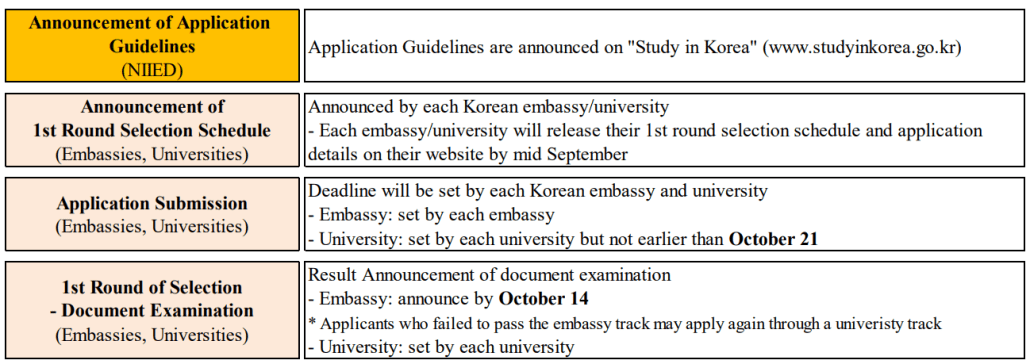
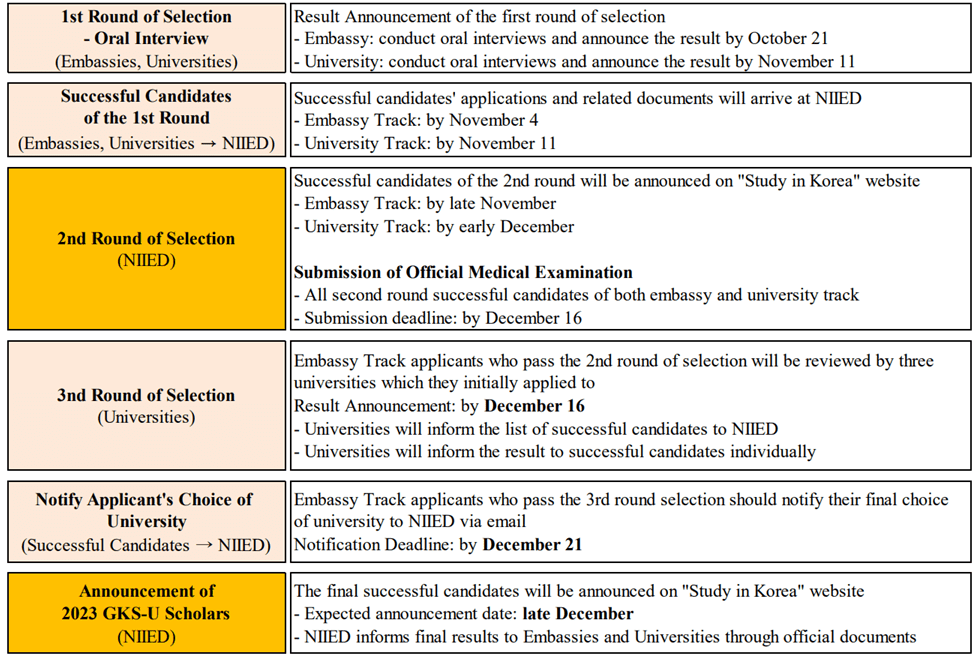
Submission Documents The Global Korea Scholarships (GKS 2024)
Application period and method of submission
-Application period: Each Embassy and university has its own application deadline, so applicants must check with the respective institute before submitting the application
-Method of submission: Each Embassy and university that conducts the first round of selection may have its own document submission guidelines, so applicants must check with the respective institute before submitting the application
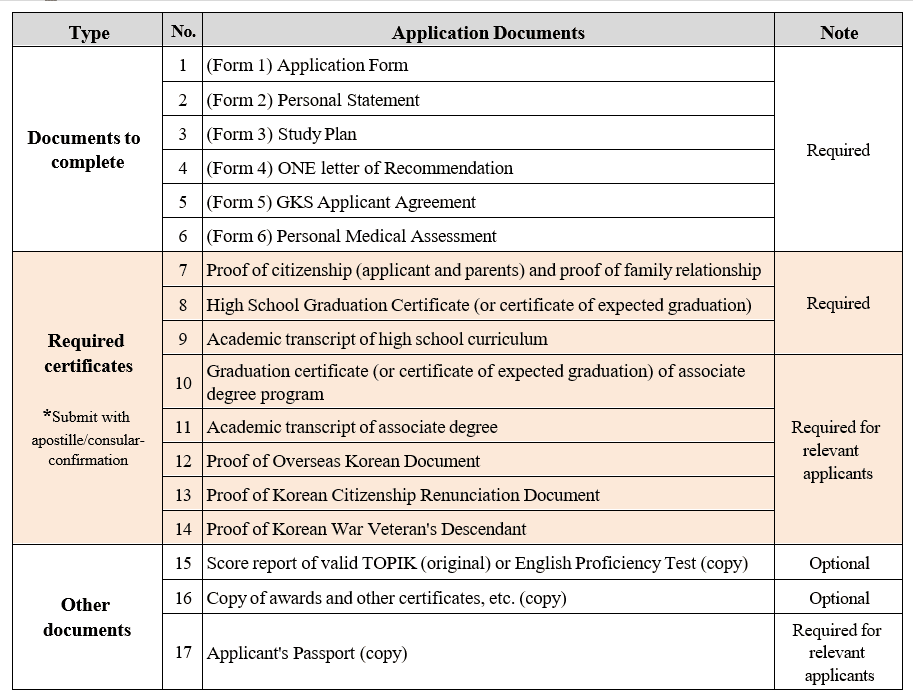
Document preparation for application The Global Korea Scholarships (GKS 2024)
– Application documents for the FIRST round of selection (embassy/university)
-Submission requirements: set by each embassy/university (e.g., whether they accept a photocopy, electronic file, documents without certified translation, etc. for the first round of selection)
-Number of documents to submit: set by each embassy/university
* Documents to complete: Application, Personal statement, Study plan, Recommendation letter, Application agreement, Personal medical assessment (form 1~6).
** Required certificates: Certificate of (expected) graduation, academic transcript, proof of citizenship, proof of Overseas Koreans, etc.
All applicant documents sent to NIIED for the second round of selection must meet the submission requirements for the second round of selection
Application documents for the SECOND round of selection (NIIED)
Submission requirements: All forms must be filled in English or Korean with the applicant’s original handwritten signature
※ No need to be apostilled or consular confirmed
Number of documents to submit:
-Embassy Track: ONE original document + THREE additional simple photocopies
-University Track: ONE original document
– Submission requirements
-Documents written in English or Korean: must be apostilled or consular confirmed
-Documents are written in other languages: 1- documents written in a language other than English or Korean must be submitted with a certified translation 2-obtain apostille or consular confirmation on either the original document or the certified translation
※ If your country belongs to one of the member countries for the Apostille Convention, submit your required certificates with apostille. However, a high school graduation certificate and academic transcript can be submitted with consular confirmation.
– Number of documents to submit
-Embassy Track: ONE apostilled/consular confirmed document + THREE additional simple photocopies
-University Track: ONE apostilled/consular confirmed document
Recommendations when preparing application documents (GKS 2024)
-Application documents for the FIRST round of selection
-All documents must be submitted in English or Korean
-Please follow the submission guidelines set by each Korean embassy/university
-Each embassy/university may simplify the submission of documents based on their selection procedure. Check with the embassy/university prior to submission
-Application documents of the successful candidates of the first round must meet the submission requirements for the second round of selection upon arrival to NIIED
-Application documents for the SECOND round of selection
-If any of the required documents are not submitted or if any of the application forms are submitted without the applicant’s signature, his or her application documents may be excluded from the evaluation
-If your document is unable to be re-issued, please keep the original and obtain an apostille (or consular confirmation) on a notarized copy
※ All applications submitted to NIIED will not be returned in any case. (NIED stores the original application for a period of more than 5 years)
-Simple photocopies or notarized copies of the apostilled (or consular confirmed) documents are NOT accepted. However, a true certified copy (등본 인증) issued by a Korean embassy or a certified true copy issued by a government agency that issued the original apostille document will be accepted
-If an applicant graduated from a third country, he or she can submit a graduation certificate and academic transcript with a consular confirmation issued by an embassy of the relevant country
-Required certificates that are issued online must also be apostilled (or consular confirmed)
-If there is an expiration date on an apostilled or consular confirmed document, the validity of the document will be judged based on the date indicated on the authentication. If there is no specific date indicated, the document will be accepted if it was submitted within 2 years from the date of authentication
-If a university requires additional documents (e.g., portfolio), applicants must submit those materials directly to the university
Document submission requirements for the second round of selection at NIIED
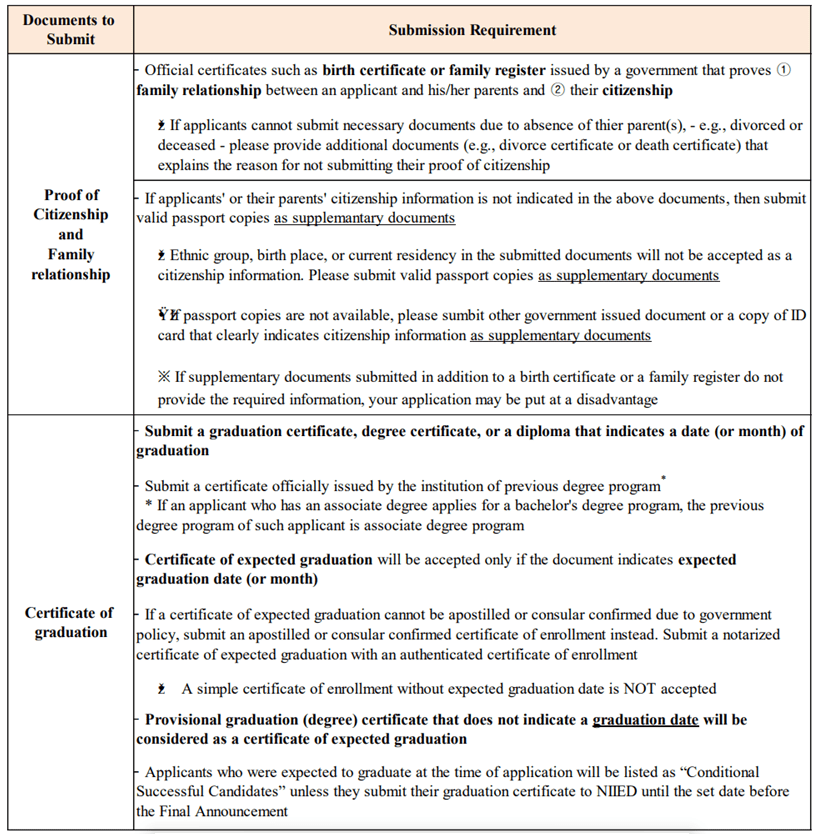
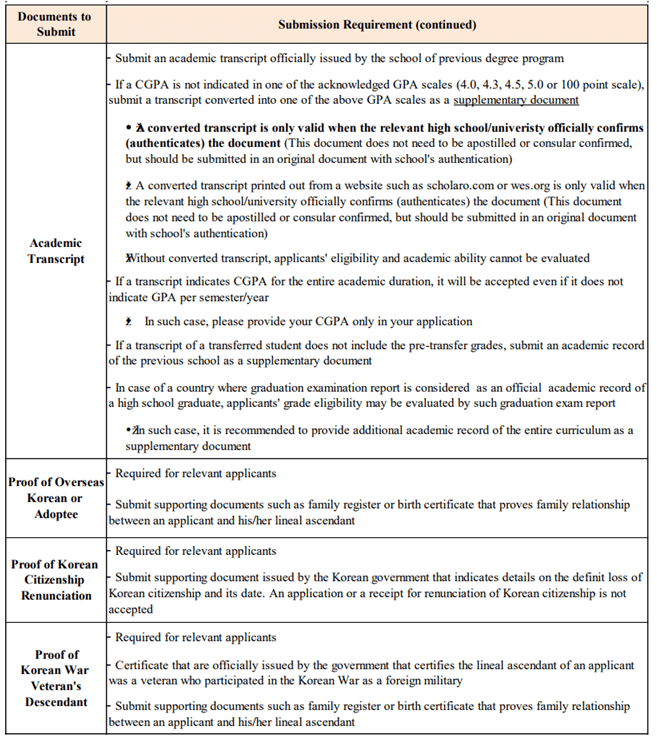
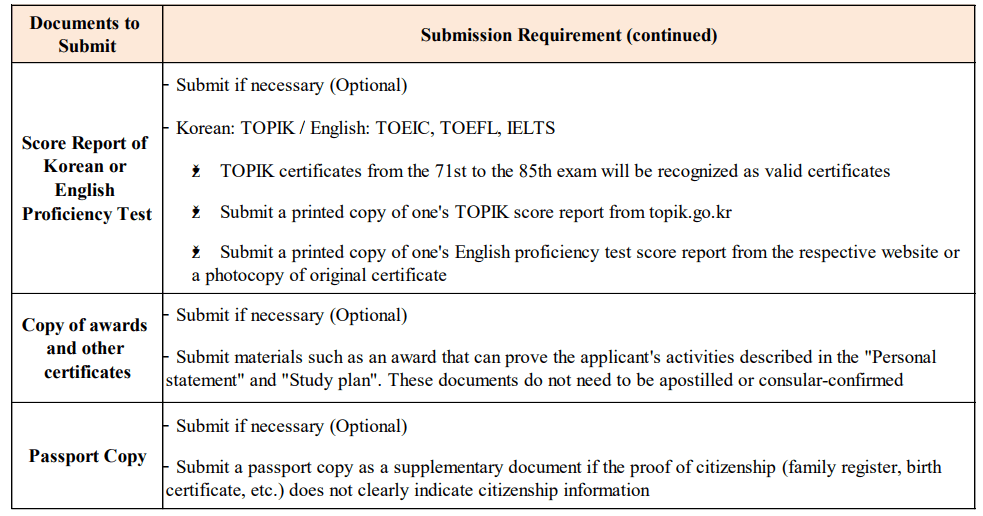
Things to check when submitting application documents [Both Embassy and University Track]
-Applicants must put the official name of the university/department they are applying to
※ Applicants can only apply among the universities and departments listed in the “University Information” file. If an incorrect department is written on an application, such an application may be disqualified from the evaluation
-Applicant’s English name MUST match the name on their passport
*(Attention!) Any discrepancy in the applicant’s name (family, given, middle name) will cause a delay in visa processing
-Applicants must check the completeness of all application documents
-Application documents must be submitted in the order of the “Application Checklist.” which itself should be the front cover of each set of application documents
-Please number and label each document on the top right corner
-All documents should be submitted as A4-sized (or letter-sized) documents
-If a document is a smaller than A4-sized (or letter-sized) document, attach it to a blank A4-sized paper. If a document is larger than an A4 size document, fold the document into A4 size.
[Embassy Track]
-Embassy track applicants must check the requirements when filling in desired universities
Applicants can choose up to THREE different universities
※ Applicants cannot choose three different departments from a single university
-Of the chosen universities, at least one university must be from Type B universities
※ If applicants fill out a Type A university in a Type B section, their application may be excluded from the evaluation.
-Please be reminded that if applicants choose all three universities among highly competitive universities, even if they pass the second round of selection, some can fail from all three universities in their final round of selection.
[University Track]
-University track applicants should fill in ONE university in their application
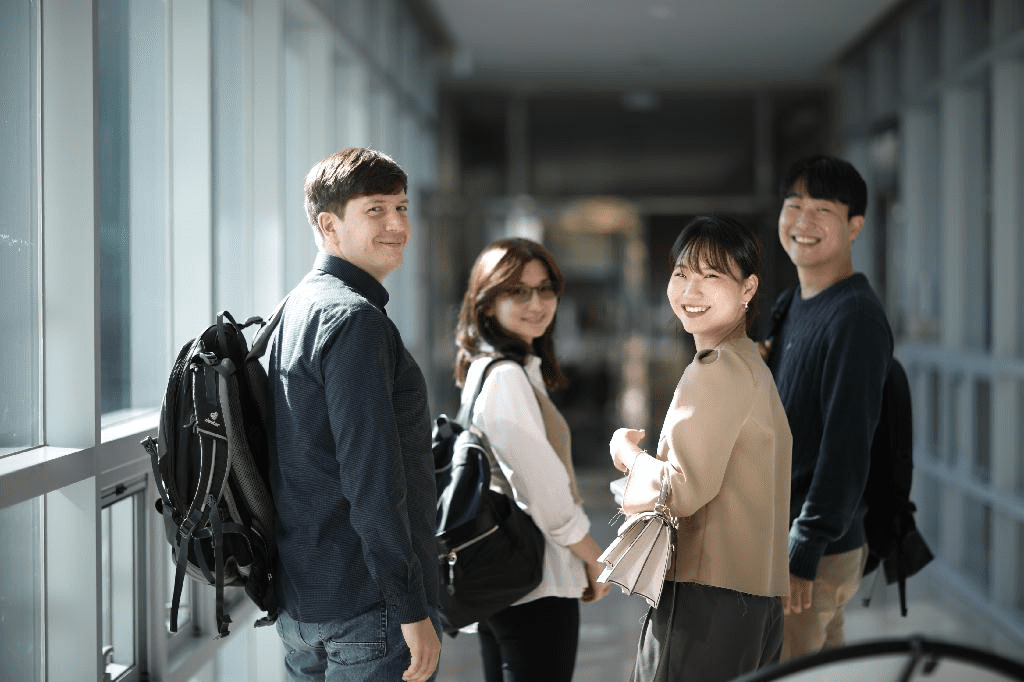
Evaluation Process: Undergraduate Degrees Global Korea Scholarships (GKS 2024)
Main Points of Evaluation Global Korea Scholarships
-Review of Qualification: Selection committee will conduct a document examination (citizenship, level of education, academic grades, etc.) and verify whether an applicant is qualified for the program.
-Review of Competency: Selection committee will evaluate each applicant “s competency through document examination and an oral interview.
Additional Points Global Korea Scholarships
Prior Notice) The notice below is effective starting from 2024 GKS Selection (1st and 2nd rounds)
-Applicants will receive additional points based on language proficiency in Korean and English
Korean: points will be given to applicants with valid TOPIK certificates based on their TOPIK level
English: points will be given to applicants with valid English proficiency certificates based on their test scores (TOEFL, TOEIC, IELTS, etc.)
-Overseas Koreans
-Applicants from low-income families or underprivileged backgrounds
-Applicants who submit a high score on English proficiency tests (TOEFL, TOEIC, IELTS)
-Applicants who applied for a natural science and engineering department in a regional university
– (Relevant to associate degree applicants) Winner of a national-level competition on technical skills
Medical Assessment
Subject for examination: All applicants who pass the 2nd round of selection
Submission of Official Medical Examination
-Official Medical Examination issued by a medical doctor or a licensed hospital should be submitted to NIIED by December 16, 2022. Additional information will be provided when the second successful candidate is announced
How Medical Assessment Results will be used
-After arriving in Korea, all GKS scholars will be subject to a medical examination administered by NIIED. If results indicate that a GKS scholar falls into one of the cases below, he or she will be disqualified from the scholarship. Such scholars must return any scholarship (e.g., airfare, settlement allowance, etc.) received and return home at their own expense
-Applicant tested positive on drug tests
-An applicant with a serious illness that prevents him or her from studying abroad for a long time, including the full duration of the Korean language program or degree program in Korea.
Final Announcement The Global Korea Scholarships (GKS 2024)
Announcement of Final Successful Candidates
- (Embassy Track) Universities should notify each candidate of the result of the third round by December 16, 2022
※ Candidates who fail from all three universities in their final round of selection will be disqualified from the program
- Embassy Track applicants who pass the 3rd round selection should notify their final choice of university to NIIED via email by December 21, 2022
- Among the successful candidates of the second round (university track) or the third round (embassy track), those who newly achieved TOPIK level 5 or 6 should send their TOPIK certificate to NIIED via email by December 21, 2022
- NIIED will classify those who have obtained TOPIK level 5~6 as those who enter degree programs. All other successful candidates will be arranged for a Korean language program
※ TOPIK certificates from the 71st to the 85th exam will be recognized as valid certificates
- NIIED will notify the list of final successful candidates to embassies and universities by late December
- The list of final successful candidates will also be announced on Study in Korea website (www.studyinkorea.go.kr)
Final Successful Candidates will receive invitation letters and guidance on entry from NIIED
Scholarship Information The Global Korea Scholarships (GKS 2024)
Bachelor’s Degree Program: 5~7 years
-1 year of Korean language training + 4~6 years of degree program
Associate Degree Program: 3~4 years
-1 year of Korean language training + 2~3 years of degree program
Important Notes regarding Scholarship Period
-Applicants who submitted TOPIK level 5 or 6 will be exempt from a Korean language program
-Those who receive TOPIK level 5 or 6 within the first 6 months of the Korean language program will be exempt from the remaining 6-month language program and must start their degree program in the following semester (September 2024).
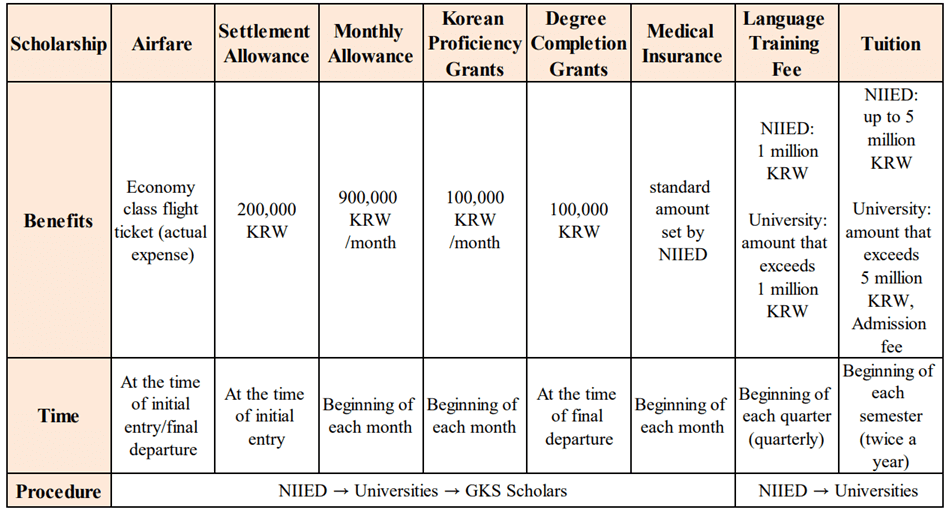
Frequently Asked Question: Undergraduate Degrees GKS Scholarship 2024-2025
The announcement for the undergraduate program will be posted on the Korean Embassy website around August, and for the graduate program, the announcement will be made around February. Korean Embassy website:
http://mys.mofat.go.kr/english/as/mys/bilateral/bilateral/index.jsp
No, it doesn’t work that way. You must send your application to the Embassy. This is how the process will go:
-You send your application to the Embassy
-Embassy reviews your application
-Around 5 applicants will be selected for the Embassy interview (the interview is conducted in English, not Korean)
-Embassy selects 1 or 2 applicants (depending on the quota) from the interview → 1st Selection
-Embassy sends the documents of the applicants who passed the 1st Selection to NIIED in Korea
-NIIED reviews the application and selects the applicant → 2nd selection
-NIIED sends the applicant’s documents to the 3 universities selected by the applicant (applicants are required to choose 3 universities in the application form)
-University reviews the applicant’s documents and confirms the selection→ 3rd selection
-Applicant is granted the scholarship
You may visit the Embassy to submit your documents (you can just submit them at the guardhouse. ‘Attention: KGSP’) or you can also send your documents by post to this address:
To: Embassy of the Republic of Korea, No. 9 &11 Jalan Nipah off Jalan Ampang 55000 Kuala Lumpur
Attention: KGSP
No, you cannot. Please apply to the Korean Embassy in your own country.
It depends, but usually, we receive around 50 applications every year.
You may, but we will review your high school results (SPM, O’Level, etc.) in order to be fair to other applicants.
The university you want to apply to may need to be informed because the Unified Examination Certificate is not widely known in Korea. In order for the school to understand what UEC is, you are advised to explain in your application document that UEC results are equivalent to high school results comparable to O’Level.
An original copy is a document that the appropriate authorities have verified; the actual original document is not required to be submitted. Your school’s principal, a Division A government official, or an oath commissioner can certify documents.
Yes, that is correct.
You can obtain it from any instructors who have previously taught you in high school (undergraduate) or college/university (graduate).
Please email your professor or lecturer a soft copy of your recommendation letter, and ask them to mail it on your behalf to the Kuala Lumpur Embassy of the Republic of Korea.
Please visit http://www.studykorea.go.kr/
Enter your desired major in the “Major” field on the main page’s right side and press the “Search” button.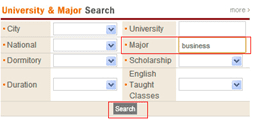
Universities offering this major will be displayed.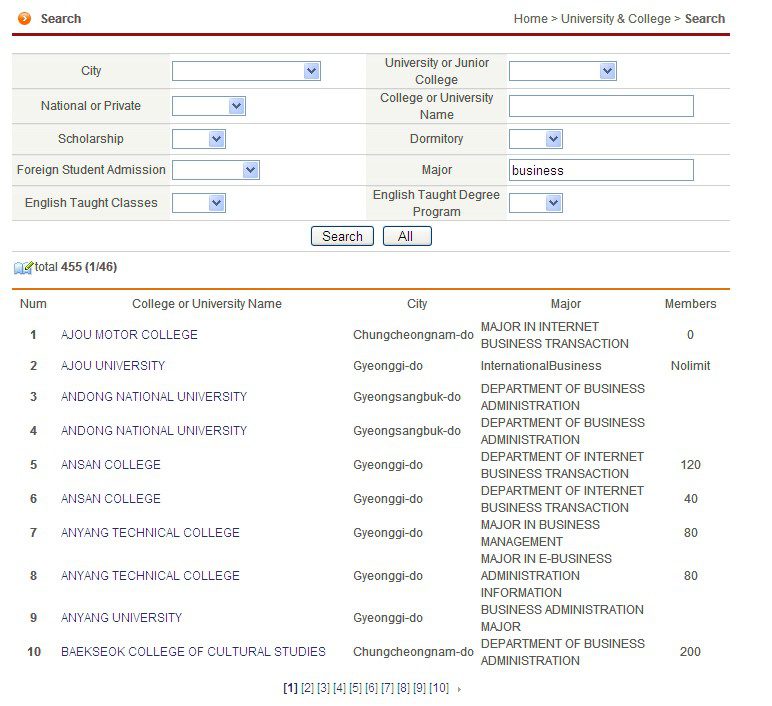
A: Please check the QS Asian University Rankings or use any search engine to look up “Korean universities ranking.” Visit http://www.studykorea.go.kr for more details if necessary.QS Asian University Ranking: http://www.topuniversities.com/university-rankings/asian-university-rankings
IELTS or TOEFL certification is not required; having one is just a benefit. You decide whether or not to take the test. You are free to submit your MUET results.
Numerous universities in Korea now offer English courses. Visit the English website of the universities you are interested in to carefully check before making your selection.
You can, indeed. The recipients of scholarships must spend a year taking a foundational Korean language course at the institution that NIIED has chosen. However, the TOPIK (Test of Proficiency in Korean) level 5 or higher grantees are exempt from taking the initial Korean language course.
It would be appreciated if you could read the guideline carefully before sending your inquiries because it contains all the information you require.
Submission of language proficiency test results is not mandatory. However, applicants from highly competitive countries may be required to demonstrate language proficiency.
Before applying, ask the university if they also require certain language skills for admission. Additional points (10% of total points) will be awarded to applicants with a valid TOPIK Level 3 or above in the 1st and 2nd round selection.
If possible, get a letter of recommendation from someone with good academic performance. B. A teacher, principal or head of department at your university. The date of the letter of recommendation must be within one year of the application deadline.
Translate documents into Korean or English (certified translation). Documents translated into the original language must be submitted along with the originals or certified copies of these documents. All testimonies must be examined by the consulate or apostolate before submission.
For the letter of recommendation, first, have the applicant show the original letter of recommendation, and then make three identical copies (photocopies or printouts) of the first letter of recommendation.
The referrer must sign and date all four of her letters and seal the envelope. Then you can pack them individually or combine them in one envelope.
You must submit the original letter of recommendation from your referrer.

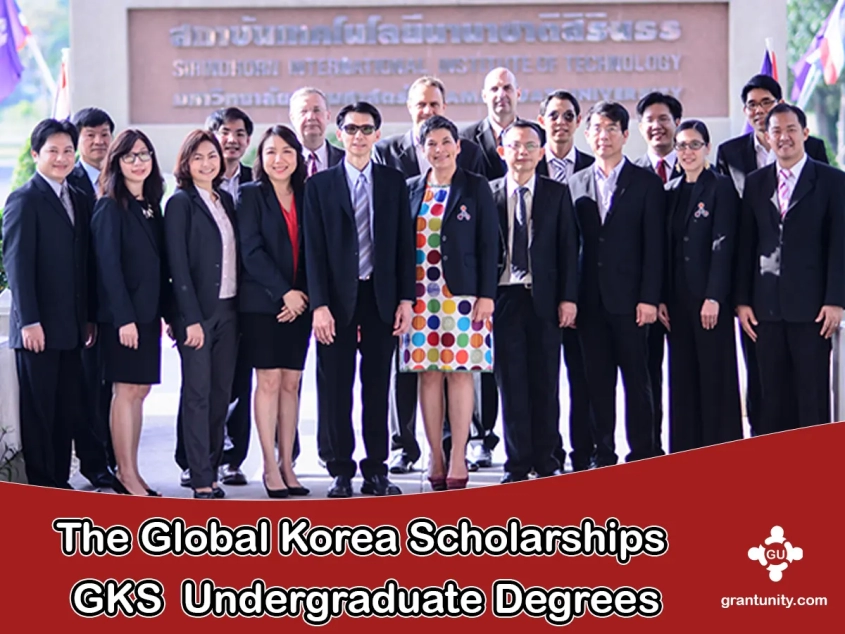

Hi actually I am looking for tourism and hospitality course for my bachelor and in 12th i got 58% so can I get this scholarship?
Hi Sanjana.Thanks for your question. The entry requirement for GKS- KGSP scholarship is a CGPA of at least 80% from your previous degree. Although this changes depending on the course and the number of applicants applying for this scholarship.
Oh my goodness! Impressive article dude!
thanks for your visit.
With havin so much written content do you ever run into any issues of plagorism or copyright
violation? My site has a lot of unique content I’ve
either written myself or outsourced but it seems a lot of it
is popping it up all over the web without my authorization. Do you know any ways to help stop content from being ripped
off? I’d certainly appreciate it.
hi, no, we didn’t have any plagiarism or copyright violations. because we write the whole of our content uniqe.
Informative Woгds
Thanks Enhance.
it was great post
thank you
I want to apply for the GKS undergraduate 2024
And I chose to apply through University track because of how far the Korean embassy is from my home
So here is my question
If I apply through the university track do I still need any documents from the embassy?
And can you please recommend any university that has forensic science? Please
Hi Olamide,
My recommendation is that go to QS or THE ranking websites, then filter your study field and country. That is how you can find the list of universities in that particular field. Let us know if you have other questions.
Thanks please reply soon🤲